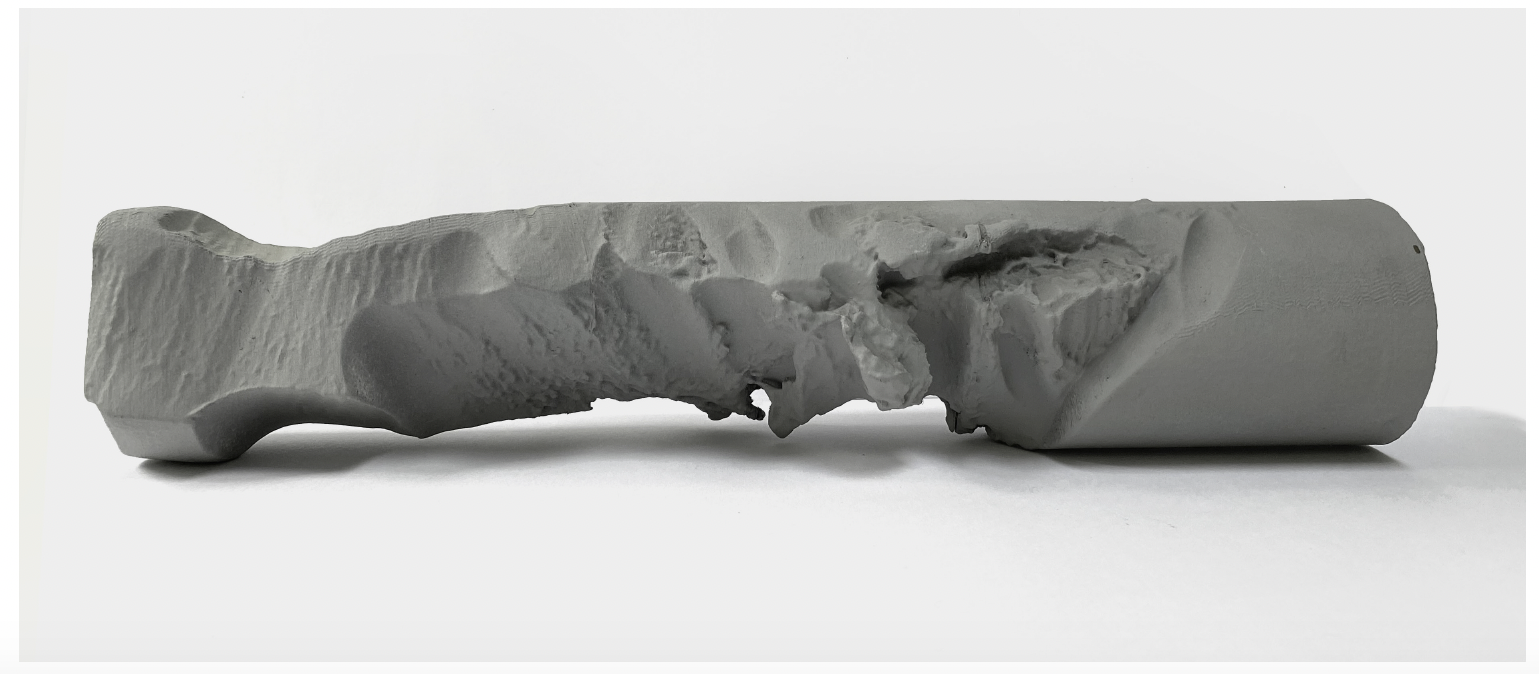
Ironsmith and the Folding of Supernovae
Various Dimension and Material, 2010
Ironsmith and Folding of the Supernovae / Russian Cosmism, A Third Translation.
Though with opposite aims, with Cosmism's curiosity in the immortal human becoming the material universe and Corday's interest in the humility of the human as a temporary duration of the universe—the foundation of thought—the inseparable medium or indissoluble nature of atoms is shared between this twenty-first-century artist and nineteenth-century microbiologist N.G. Kholodny.
The following is an excerpt from Corday’s online journal.
We share atoms with the living and the dead.
Atoms never die; humans do.
An atom from this breath of air in your lungs was once in human lungs many millennia before and after you. In this closed-system biosphere, we share all atoms of air, water and food not only within each other but recycle as each other: all plant, animal, and human-life.
Shared bodies become shared body.
Our human blood, marrow of our bones, nerve endings are evolving structure and substance of the same atoms once assembled as ancient suns.
Shared forms become shared form.
Atoms are a universal material of production; a fundamental medium of materiality and perpetual wet clay for the universe as for the artist. Two sculptors using the same cosmological tools of pressure and temperature assembling atoms into forms on earth as well as into forms as Earth.
Shared suspensions become shared suspension.
The subjects and aims of Russian Cosmism would be misunderstood if placed solely into the musings of science fiction. Cosmism calls for us to collectively focus all resources, harness our intellect as the presumptive highest evolutionary structure of the universe, and technologically, biologically, free ourselves from the purposeless auto-trajectory of physical law and strike-out on our own path as an undying form of the universe. A devotion to inspire all technology through the single goal of each human life as equal and immortal––as we sail through space in our electric ship called Earth, allowing all humans, all that ever were or will be, to populate the cosmos indenturing the atoms of the universe into the purpose and experience of being human.
At what moment is the human soul produced in the blur of shared forms? Which cells are immortalized as human in the few percent of organs, muscle and bone or remaining bacteria and blood? The human body breathes, ingests, expels ninety-percent of its atoms anew every Earth year––with more atoms in the human body than stars in the universe how is form production of atoms as a universally shared-resource organized? Is a form that perpetually places itself at the pre-copernican center of the universe as supreme existence a sustainable candidate for immortal production?
I was introduced to Russian Cosmism in 2020, a year of extremes: a novel coronavirus pandemic reinforced the shared biosphere of air and biological body between human, animal and virus; a novel government and commercial rocket partnership launched two humans to the low-orbit space station furthering micro-gravity experiments in 3d-printing of human tissues, organs, and retinas, crystallizing proteins in space, processing antibodies towards the prevention of human disease. A near-cosmist focus of technology realizing humans one step closer as a sustainable interplanetary species and life's agent
The sun does not live forever yet the sun is not cephalized organism; stars do not cluster senses to create a front-facing brain conscious of its own creative impulse. Stars forge heavier elements and bring energy to other forms. The human also does not live forever yet is a cephalized organism that allows atoms to produce and devote advancing forms. The birth and death of star produces further complexity of medium to the system and the birth and death of a human allows production of further complexity of forms.
Stars cannot sustain the energy production of iron atoms and thus are forced into explosion called supernovae. These explosions advance materials as atoms fuse into heavier elements. Four grams of the very atoms that explode stars are found within humans. Iron atoms sustain our blood. Humans devote this iron to production of new assemblage of atoms.
Humans are a direction of form, a form to explore the farthest reaches of each human life individually and collectively. Forty percent of a human body's atoms came from stars; Hundreds of billions of those atoms in one human body were once in every human body; and one atom in your body was from every breath from every human. The material is immortal in a system of sharing and changing form.
Founding Cosmist Nikolai Fedorov writes all sciences should direct through astronomy and all governance through architecture
Advancing not wasting energy of the sun is one of Fedorov's aims. Applying the abundant energy of the sun as power for production references Cosmism images of lightning rods awakening the dead, early conceptions of solar panels, and fusion technologies to come such as the creation of stars on earth.
We are ironsmiths purposing the atoms of supernova. What is victory over the sun but the exchange and advancement of a still unknown universe and its medium. “Great is the mystery of the forthcoming transformation of man. He will understand that he is not a part of the universe, but its integral hypostasis. He is the whole world and at the same time a personal manifestation, a special image of this world. His properties are equally universality and personality. All beings have the same body and all things of the world have the same composition — the body and the composition of the universe.” —V.N. Muravyov. Mastery of Time [iv]
[I] Cosmism-Timeline. E-Flux. https://cosmism-timeline.e-flux.com
[ii] Elon Musk Interview May 29, 2020 NASA/SpaceX Press Conference
[iii] Astronomy and Architecture. Nikolai Fedorov. Russian Cosmism. Edited by Boris Groys. E-flux/MIT Press. 2018. pg 55
[iv] Cosmism-Timeline. E-Flux. https://cosmism-timeline.e-flux.com
First Translation: Russian
Second Translation: English
Third Translation: Art



